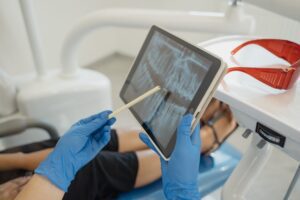The prospect of oral surgery with anesthesia can cause anxiety. In order to alleviate the concerns of our patients and their families, Dr. Puckett will always discuss the anesthesia options for your procedure and personally review the anesthesia process.
Before we administer general anesthesia, we conduct a pre-anesthesia assessment. You complete a health history form, and we perform any needed tests and get medical clearances from other specialists. These will determine your risk for complications from general anesthesia, and help us decide what kind of sedation to use.
Your concerns about anesthesia are critical to our selection. We will only use anesthesia with which you are completely comfortable.
OMS Training in Anesthesia
Oral and Maxillofacial Surgeons (OMS) are one of the few medical specialists, and the only dental specialist, that are mandatorily trained with the core knowledge and skills to administer IV sedation and general anesthesia to provide patients with the highest level of safety and comfort.
Every OMS residency includes at least four years of anesthesia training along with the other surgical training. Four to six months are spent in the Anesthesiology Department of a hospital administering general anesthesia to patients. Residents routinely manage the ventilators (machines that breathe for the patient while asleep).
OMS residents also learn to perform tracheostomies, cricothyrotomies, and proper placement of intubation tubes to maintain the airway in the event of complications. The proper use of emergency, life-saving medicines is also part of the training.
Dr. Puckett has extensive training and over 20 years of experience performing oral surgery procedures with IV sedation and general anesthesia, and he is accredited by the state of Ohio.
Anesthesia in the Oral Care Setting
OMS use general anesthesia to alleviate pain, cause memory loss, limit patient movement, and reduce anxiety while keeping the patient asleep, safe, and comfortable. We have been administering in-office general anesthesia for decades to patients for wisdom teeth extractions, dental implant placement, facial cosmetic surgery, and jaw repairs.
The same standards of care are followed in our office as in the hospital setting. EKG leads, pulse oximetry, blood pressure cuffs, temperature probes, and capnography are used on all patients under anesthesia to monitor their safety.
Preparing for Oral Surgery with Anesthesia
How safe is it?
Anesthesia for oral surgery was first used in 1846, soon became common all over the world, and has been proven over and over again to be extremely safe. Only one out of every 1,000,000 patients sedated for oral surgery die each year. This death rate is 3.5 times lower than the rate of patients put under general anesthesia in hospitals.
In a large American Association of Oral and Maxillofacial Surgeons study, only 6% of 34,000 patients given anesthesia even experienced minor side effects.
You can help ensure the safety of your surgery. Do not eat or drink 6 hours before surgery under general anesthesia to prevent transferring fluid or food into your lungs.
Be sure to share all past surgeries and any contagious or life-threatening illnesses like HIV or Hepatitis C on your health history.
Make sure we are aware of any complications you may have had with previous anesthesia, your food or drug allergies, the medications and vitamin supplements you take, and any use of illegal drugs or alcohol.











